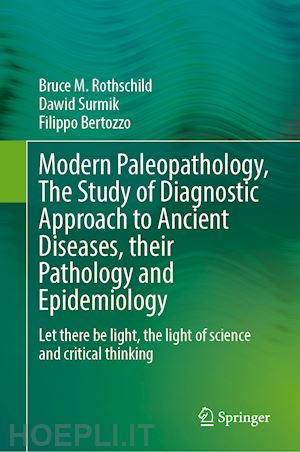Bruce M. Rothschild graduated from New Jersey College of Medicine. He is a member of the Society of Vertebrate Paleontology, Fellow of the American College of Physicians, American College of Rheumatology and Society of Skeletal Radiology and elected to the International Skeletal Society. He has been recognized for his work in Clinical Rheumatology and Skeletal Pathology where his special interests focus on diagnosis, clinical-anatomic-radiologic correlation, data-based paleopathology, evolution of inflammatory arthritis and infectious disease and origins of disease. Dr. Rothschild is Professor of Medicine at IU Health and holds a Research Associateship at the Carnegie Museum.
He has been Professor of Medicine at Northeast Ohio Medical University in Rootstown, Ohio, Adjuvant Professor of Anthropology at the University of Kansas and of Biomedical Engineering at The University of Akron, Ohio and Research Associate at the Biodiversity Institute of the University of Kansas and the Carnegie Museum of Natural History. He was the first director of the Rheumatology Division at The Chicago Medical School and a prime force behind the resurgence of data-based paleorheumatology and comparative osseous pathology.
He has been a visiting Professor at universities in the US, Canada, the Caribbean, South America, Europe, the Middle East, South Africa, Asia and Australia and has been an invited lecturer at universities, hospital and museums throughout the world. He has published over 1000 papers and abstracts, including authoritative papers on bone maturation, the origins of rheumatoid arthritis, spondyloarthropathy, syphilis, tuberculosis, character of bone changes in metastatic cancer, myeloma, leukemia, tuberculosis, fungal disease, renal disease, treponemal disease, rheumatoid arthritis, spondyloarthropathy, gout, calcium pyrophosphate deposition disease, hypertrophic osteoarthropathy, primate bone disease and critical thinking not limited to paleopathology. He is the author of 7 books and has participated in 8 Discover Channel/BBC documentaries on origins of diseases and ancient reptiles.
Dawid Surmik graduated from the University of Silesia in Katowice, Poland, where he pursued
his entire academic career from B.Sc. to a doctorate, and where he currently works as an
assistant professor and researcher. He is a vertebrate paleontologist by education with special
interests in evolutionary biology, paleoecology, and taphonomy. He became interested in
paleopathology in 2016 when he accidentally identified an intriguing bone alteration in the fossil
material he was studying. Then he started collaborating with Professor Bruce M. Rothschild,
who was his mentor in the field, and with whom he began collaborating on subsequent projects.
In 2019, he received financial support from National Science Centre, Poland for the research
project “;Osteopathologies in the fossil record as a vector of paleoecological and
paleoepidemiological information,” the frame in which he studied pathologies of Triassic
marine reptiles from Germanic Basin, terrestrial Triassic tetrapods from Krasiejów, Poland and
dinosaur pathologies from Gobi Desert, Central Mongolia. Dawid believes that the prevalence
of diseases in animal populations sheds light on biosphere stress and is one of the most important
factors influencing the survival of organisms in nature. Traces of diseases in the fossil
material provide a deep and multilevel understanding of the processes governing the evolution
of life on Earth. In particular, he thinks that examination of the occurrence of cancer in various
extinct animals will expand our knowledge of the evolutionary biology of neoplasms.
He is the author of several dozen publications including abstracts and scientific papers. He is the
reviewer and editorial board member of several respected scientific magazines. He collaborates
closely with several European research institutions, in particular with the University of Bonn,
Germany, where he is an associate researcher.
Filippo Bertozzo is a postdoc researcher at the Royal Belgian Institute of Natural Science in Brussel (Belgium). He studied in Italy, obtaining an undergrad diploma at the University of Bologna with extensive work on the ornithopod Ouranosaurus nigeriensis, and later a Master in Science at the Universität Bonn, Germany, with an analysis on the histology of pneumatic bones in sauropod dinosaurs. He graduated at Queen’s University Belfast -under the Horizon 2020 Program of the Marie-Curie Foundation- in 2021. His doctoral dissertation was aimed to i











